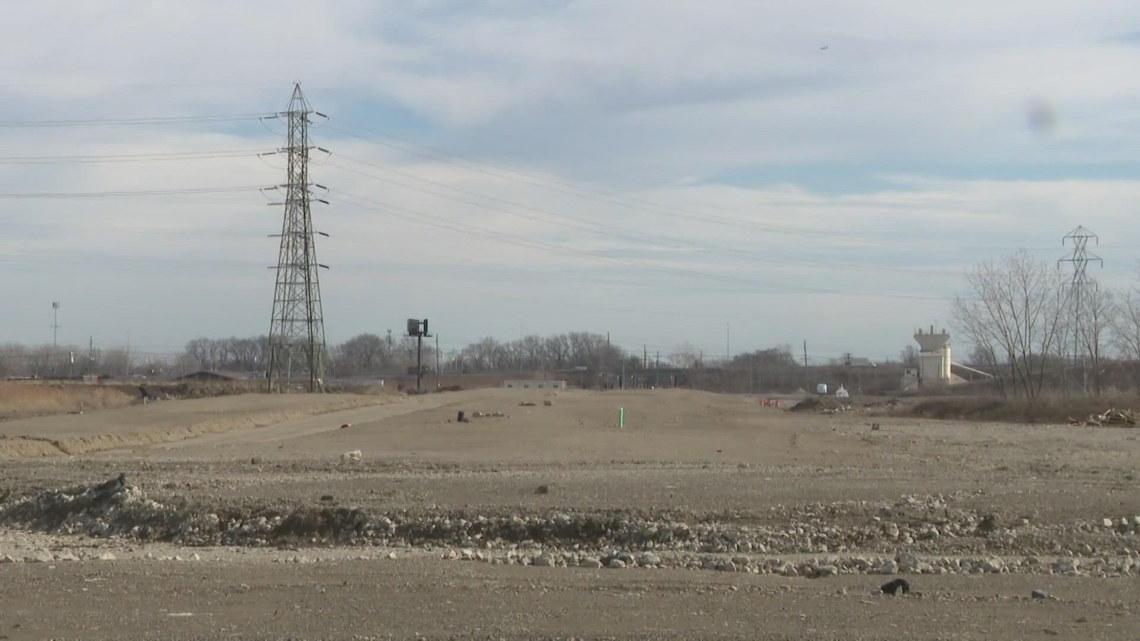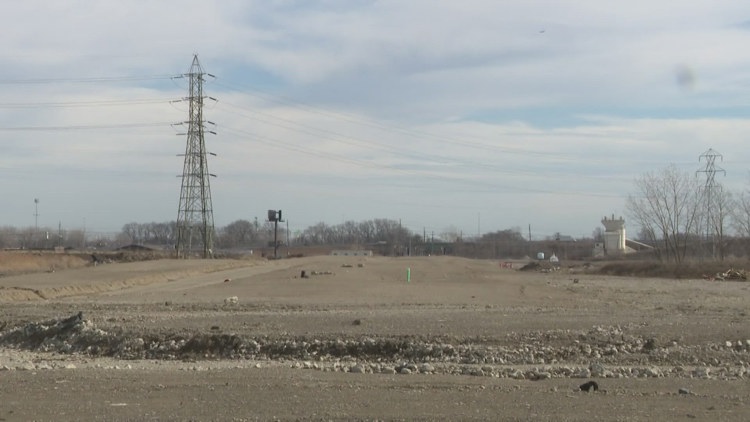

Plans call for the 176-acre site in Brook Park to house the new Huntington Bank Field enclosed stadium, as well as the adjacent mixed-use development.
CLEVELAND — The Cleveland Browns have announced that they have executed a clause to “solidify the purchase” of 176 acres of land in Brook Park that will be the site of their new domed stadium and adjacent mixed-use development.
“We have executed the clause and taken the necessary steps in our land purchase agreement with the current owners to solidify our future purchase of the 176-acre site in Brook Park for a new Huntington Bank Field enclosed stadium, along with an adjacent mixed-use development,” said Haslam Sports Group Chief Operating Officer Dave Jenkins in a statement issued on Thursday. “While work remains with our public partners on the project, this is a key step in our efforts to create a responsible long-term stadium solution that delivers a world-class experience for our fans, attracts more large-scale events for our region and positively impacts our local economy.”
The Haslam Sports Group previously stated its intention to pay $1.2 billion of the $2.4 billion estimated price tag for the domed stadium facility, which did not include another $1 billion for the entertainment district surrounding the stadium. The other $1.2 billion would come via public money, although a specific public-private funding plan has not yet been announced.
Plans call for the first phase of the development, including the domed stadium, to be ready to open in 2029. The first phase will include 450 hotel rooms, 575 apartments, 96,000 square feet of traditional retail, suited for unique food & beverage and shopping destinations; and 137,000 square feet of experiential retail, which will include a team store, and other experience-based retail concepts that will drive year-round activation and community involvement.”
The development, done in partnership with Lincoln Property Company, will ultimately include 300,000 square feet of retail, two upscale hotels, 1,100 apartments, and 500,000 square feet of office.
PHOTOS: Proposed entertainment district adjacent to Cleveland Browns domed stadium in Brook Park
HOW WE GOT HERE
With the lease on Huntington Bank Field set to expire in 2028, team owners Jimmy and Dee Haslam announced in March of 2024 that they were down to two options when it comes to their future stadium site: a $1 billion renovation to the existing downtown stadium, or a domed stadium outside of the city at double the cost. Word soon spread that the Haslams had optioned more than 170 acres of land in Brook Park near Cleveland Hopkins International Airport.
On Aug. 1, in what the city called “a competitive deal to retain the Cleveland Browns at their current stadium site,” Mayor Justin Bibb put forth a $461 million financing proposal to the Haslams to renovate the 25-year-old facility. The plan included a 30-year lease arrangement.
Six days later, the Haslam Sports Group unveiled renderings and video showcasing what a domed stadium complex in Brook Park would look like. In a letter, Jenkins referred to the idea of building $2.4 billion dome in Brook Park as a “transformational option” that will create “a modern, dynamic, world-class venue that would greatly enhance the fan experience and enable the State of Ohio and our region to compete for some of the biggest events in the world 365 days a year. Similar to other markets in the Midwest, this proposed domed stadium would catalyze our region in a major way.”
Less than a week later, Cuyahoga County leaders pounced on the proposal, arguing it “does not make fiscal sense” for citizens and taxpayers. Executive Chris Ronayne urged the team to focus on renovating the current stadium, and stated that “any proposal that would create an unacceptable risk to the County’s general fund cannot be considered.”
On Oct. 17, the Browns confirmed their plans to move to Brook Park with plans including having an adjacent mixed-use development alongside the domed stadium. Team owners argued renovating the current stadium would not solve long-term issues, and that a domed stadium would allow them to host big events year-round and generate more revenue in the region.
In a press conference that same day, Bibb expressed his deep disappointment in the Haslam Sports Group’s decision, calling the team’s choice “frustrating and profoundly disheartening.”
“We have exhausted every single option to keep the browns in our city without compromising the general revenue of our city,” Bibb said during a press conference. “We remain committed to doing what we can to keep the Browns in Cleveland if Brook Park is not viable.”
One week after the announcement, the Browns filed a federal lawsuit asking a judge to declare the Modell Law, which requires any Ohio team playing in a tax-supported facility to give the city or locals the chance to buy the team, unconstitutional. Ohio Attorney General Dave Yost later filed a motion to intervene on the city’s behalf, which was granted.
“Nobody in this city can expect us to go away without a fight,” Cleveland City Council president Blaine Griffin said at the time. “So I’m glad that it’s in the courts, but it’s not going to stop us from being advocates for our city.”
In November, a Cleveland-commissioned study claimed Brook Park was not a viable option for the team. It found Brook Park would find it difficult to attract residents and retailers and also showed Cleveland would take a hit without a stadium, losing $30 million in economic activity and $11 million in tax revenue.
But a competing study commissioned by Haslam Sports Group found that while the move would close the door on the snowy types of home games, the Brook Park site would open the door to nearly 5,400 jobs and $1.2 billion in economic activity for Cuyahoga County.
Last week, Bibb sent a letter to the Browns that declared the city’s intentions to enforce the Modell Law, including taking “a leadership role in assembling an ‘individual or group of individuals who reside in the area’ in purchasing the team” should they go forward with a move out of downtown. If the club does not respond by Jan. 9, “the City intends to take appropriate legal action.”
The following day, the Haslam Sports Group told 3News they are determined to build a new enclosed stadium and adjacent mixed-use development.
“We intend to respond directly in due course to Mayor Bibb’s letter and have no further comment at this time,” the statement read.
3News’ Matt Rascon and Tyler Carey contributed to this report
